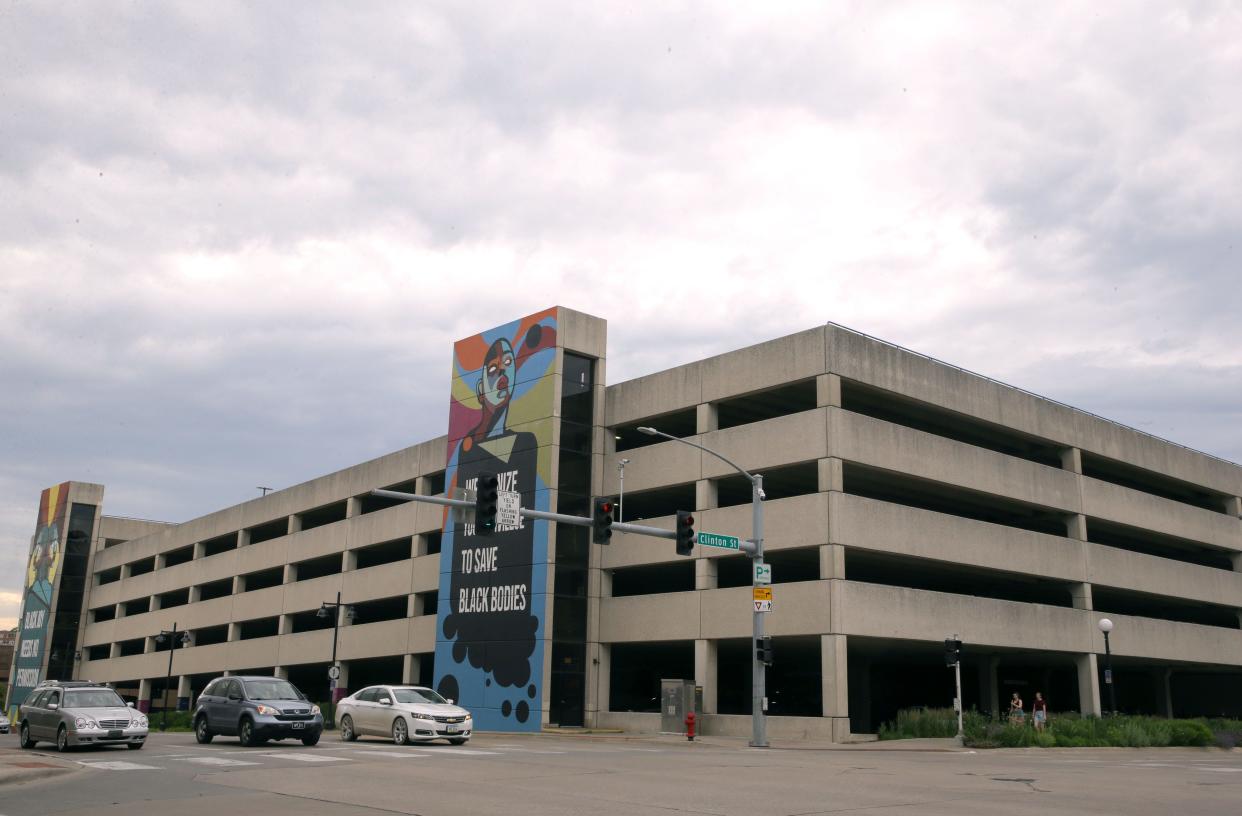Iowa City's plate reading technology approved in parking ramps. What to know:

Iowa City's parking department can use automated license plate technology in city ramps and on certain city parking enforcement vehicles. They are also allowed to use traffic cameras "primarily for traffic engineering and study."
The ordinance was passed and adopted into Iowa City code by a narrow 4-3 vote by the Iowa City City Council on Tuesday, August 20. Councilors Andrew Dunn, Laura Bergus, and Mazahir Salih voted "no."
The 'no' votes came despite the council unanimously adopting Dunn's changes prior to the final reading and vote to the surprise of some councilmembers.
More: Iowa City moves closer to using automated license plate cameras in parking ramps
Cameras meant to save time, city says
City staff said the new code will increase efficiency and save time for both the city's Parking Division and the community. The recently installed cameras are equipped with plate reading capabilities in three of the city's ramps. The two ungated ramps at Chauncey Swan and Harrison have the tech available, as does the gated Capitol Street Ramp. Those cameras have not yet been activated.
Staff members said the cameras would improve efficiency around the entrance and exit of the city's gated ramps. Associate Director of Transportation Mark Rummel estimated the technology will save the division an hour of manpower per ramp per day.
Rummel said the cameras will also discourage customers who park in a ramp for several days and then choose the 'lost ticket' option open at the exit gate. Likewise, the camera tech will help drivers who actually misplace their tickets.
Drivers with city parking permits would also no longer need a physical "hang tag" that is issued annually.
Traffic cameras are OK
The city's "traffic engineering" cameras—or "intersection cameras"— are now code-exempt as well.
The city uses intersection cameras to investigate damaged or malfunctioning traffic signals.
The council held lengthy discussions about Flock cameras recently as they built the Fiscal 2025 budget, ultimately deciding not to buy them. Flock is an automated license plate reader that some police departments, including the University of Iowa PD, have used.
More: Vote for top offensive player in Iowa City area entering 2024 Iowa high school football season
City can't store license plate data for common use
A previous council had instated protections against the use of automated plate readers and automated traffic surveillance systems and necessitated this change.
The recent change carved out legal definitions for the use of the traffic-related automated systems. It restricts the city from storing, selling or aggregating data from the automated plate cameras and automated traffic systems "unless the data directly pertains to a qualified traffic law violation or other criminal law violation for which a ticket, citation, or arrest was issued."
Councilors voted unanimously in favor of these amendments.
On plate cameras, the ordinance will now read:
"Automatic license plate recognition systems or devices installed in City parking ramps or on City Parking Department vehicles, primarily used for parking enforcement, are not included in this definition."
On traffic camera technology, the ordinance reads:
"Specific Streets and Traffic Engineering Division cameras installed at intersections with traffic signals or roundabouts, used primarily for traffic engineering and study, shall not be included in this definition."
More: Iowa's 39 EF1 tornadoes set single-year record, NWS says

Council did not want to completely restrict police from accessing cameras
The language in the amended city code still allows police to access the parking cameras during investigations, consistent with department policy.
Previous discussions considered limitations to the police department's power to use these cameras in relevant investigations. For example, some of the off-the-cuff amended language proposed by Dunn at the last meeting had unintentionally created exclusions for police by limiting camera usage "exclusively" to the Parking Division.
This could have then stopped police from using the parking and traffic cameras to help investigate a sexual assault where they had little other details to work with, for example, City Manager Geoff Fruin said at a previous meeting. The council seemed hesitant to limit police use in all cases.
Councilor Shawn Harmsen also noted on Tuesday that police could have used the cameras to help locate a missing person "out of concern for their health and safety" during a recent investigation.
He wanted to ensure that the code did not restrict police and still allowed investigators to use the litany of city cameras to find or investigate a person's whereabouts in a similar situation.
City Attorney Eric Goers said that would be allowed in the altered code.
Councilor Dunn wanted the city to find a balance between stopping the omnipresent use by city departments and allowing other relevant uses, like a police investigation where little other evidence is available.
"The really big thing that I wanted to avoid was excluding entire camera systems," Dunn said. "This excludes cameras used for a specific purpose in a specific way, but it does not exclude every camera that is operated by the traffic services department. I believe that, functionally, it has the same effect as was desired by staff."
Goers said the amendment did not amount to a "substantive change" of the previously twice-passed ordinance after some additional late modifications by Dunn. A substantive change would have required the council to consider the code change three times again and adhere to Dunn's initial language.
More: Suspect in Marion quadruple murder deemed competent to stand trial in April 2025
Ryan Hansen covers local government and crime for the Press-Citizen. He can be reached at [email protected] or on X, formerly known as Twitter, @ryanhansen01.
This article originally appeared on Iowa City Press-Citizen: Iowa City OKs automated plate reading technology in parking garages
